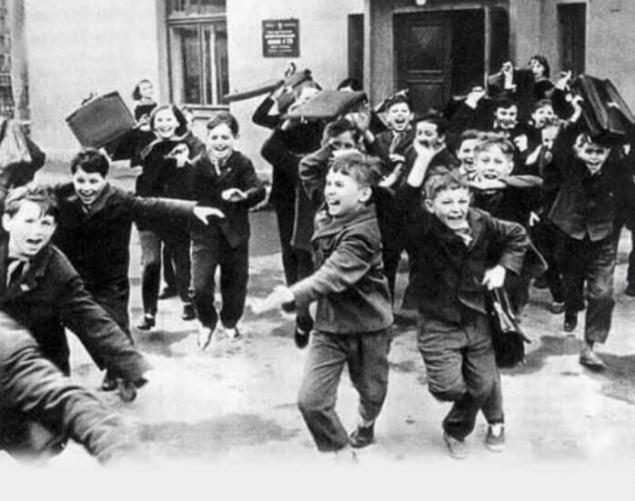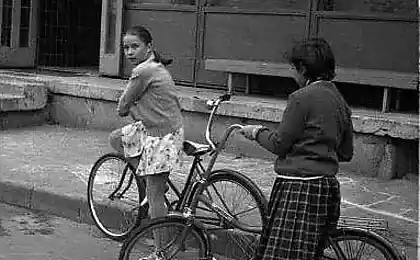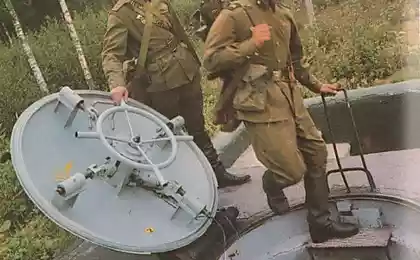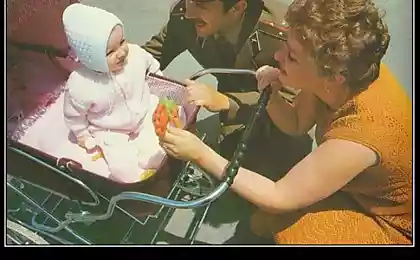547
5 truths about children who hard to make parents who grew up in the USSR
From the author: I was born in the last century. And even more — in the last Millennium. When I was born and grew up in was a different country and, most importantly, it was a different life. And now, much has changed, but we adults continue to bring in the next generation the educational legacy of our parents.Our mothers and grandmothers grew up in "Terry" of the USSR. And they taught us how to be moms. A living example they showed us what it means to "educate". We learned from them paradoxical things, such as "Shut up and eat!" or "Put on your jacket my mom is cold". I sometimes catch the tone and actions of her mother, which she (I know) I took from my mom. And it scares me more than happy.

Today I can admit that my whole experience of motherhood is, "look at mom and grandma and do the opposite." Not because they are bad, but because their version of parenting was the forced isolation of the construction of communism. I was raised "casually". "Over me" my mom worked two jobs, carried out a plan, got food, had a fight with dad and gave birth to a second child. I grew up and I said to myself that want to educate their children consciously, with love and passion for this business. And for several years I cultivated my inner mom and set her free from the prejudices of the Soviet system of education, which (incidentally!) was largely excellent.
Ten years ago I became a mother for the first time and since it knew nothing about how to raise children, called to his aid the nanny. Consider their personal merit and that we didn't break up with her so far and now under the patronage of her trusted my youngest son. The nanny, by the way, a young woman with more than 15 years of experience in kindergarten. And it's exactly the love and passion for children. I never saw it.
I was lucky: I had (and have) the opportunity to learn to raise children in a professional. She dispelled many of my naive beliefs about education. In particular, I saw how affectionate and non-judgmental make the mistakes of the child. On the second broken in ten minutes the Cup, it only says: "Nothing terrible". I child that to feel was not possible. With her I first experienced as you can be for a child much-loved, nevertheless, when necessary, strict adult. In short, a lot has happened to me for the first time.
I not only learned to be a mother, but also healed your inner child.
And then I became a psychologist, and second child raised on an entirely different level of awareness than the first. And before I "caught" those "Soviet" educational "cockroaches", we were stuffed. And over the years I have accumulated a list, which I want to share with you. So, in my opinion:
Children can (and should!) to get dirty, play with mud and "Politica" in the puddles
Nightmare mother-housewife: a son or daughter running around the puddles, smear in the sandbox or the dirt stained dirty by helping his uncle is the janitor. I constantly witness how moms at the Playground shouting hysterically to their children: "Peter! Quickly get away from the puddles!", "Masha! Try again to pick up the wet sand!".
However, only with dirt, in the dirt or close to it is the most important stage of mental development of a child.
This stage usually lasts the child from one to three years, and at this time it is important to give him the opportunity to stomp and jump in puddles and smear swollen from rain the earth. Not lived as it should, this stage is imprinted for life different rather unpleasant "features" of the character.
By the way, some types of therapy psychologists consciously immerse the client in a regression. Soiling in the wet sand or the experience of sensations lying in the dirt gives a lot of resources.
Kids can play with food
"Food not to indulge!" — another horror story of the Soviet past. Of course not! But small children and do not indulge! They are doing important work. They explore! Believe me, in 10 years they will not play and indulge in food. And now, in 2-3 years they need it. And again: play food, for example, to smear porridge on the table, and the soup on the cheeks — it's all the same natural accommodation of the above stages of development.
Kids can waving his arms, bite and even fight
Mothers in order to wean the child from "aggressive" habits. I remember my two year old daughter quietly approached the unsuspecting children and, without saying a word, biting their cheek. I was horrified, grabbed her daughter and dragged her behind a Bush to carry out an educational conversation, frantically apologizing to the parents of the victims.
I'm not saying to fight and bite is what we should encourage our children. I just want to say: all this is completely normal.
The kids still do not know how to Express their emotions. Anger and other strong feelings just don't fit in their little body. The psyche cannot process. And our task, as conscious adults, do not deny their emotions, and to teach children to recognize and cope with these emotions. And most importantly, not to scream at this point and not require to stop. Remember that we are often our parental shame: "If my child bites or fights, I'm a bad mother!".
Better if we just suspend the children's act of aggression. We will press to ourselves. We'll talk about why that's the wrong move. So we give the child important lessons.
First, we don't overlook the child's negative emotions.
Secondly, we are called emotions.
Thirdly, we neuchem to translate natural human aggression — verbal. This skill, by the way, and adults in our society are very lacking.
Children can throw tantrums
As no fear! We adults panic fear to be in this situation: the child is in hysterics, and passers-by turn and who knows what about myself I think. In fact, hysteria is the same way to deal with emotions. We must respect it and not try anything necessarily to do with it. My daughter, who is now 10 years old, can already after a tantrum (not what she had in 3 years, of course) calmly say, "Well, just the mood is." Earlier while she was crying and almost banged my head on the wall, I had time to think about myself. About what I'm a mother, and what I got daughter. Now I know how "not to break", waiting out her feelings. I'm just saying that I'm here and always ready to talk to her after she calms down. Because emotion is useless to talk. And the knowledge that an adult is close by, not frightened of hysteria and not think after this baby is bad — is priceless. The tantrums will pass, and that knowledge will leave with the little man into adulthood.
Children can be selfish
Remember the pillar of Soviet education: "it is Impossible to be selfish and think only about themselves"? Indeed, 20 years is impossible. And in 2-3-4, and even 5 years is still possible.
The child is not born with a built-in program respect the rights of others, recognition of foreign borders and foreign values. Just the first thing he needs to learn is your own value, which is determined by how he respected with all of your desires and needs. And they have a child is selfish.
Kids do not know how to take into account other people's mental reality. My daughter has learned to understand that the mother may experience pain, upset, or suffer a little before he went to school. Even recognizing non-verbal cues about other people's feelings, the child is not their interpretation. And it's not always reflected on how to balance their selfish needs with strangers. In my humble opinion, to be altruistic and to love the whole world, you have to pass age the stage of unconditional children's selfishness. Otherwise, in adult life, we never learn to put themselves and their interests first. And time after time we fall into debilitating us consumer relations. Or try all my life to give up their desires in favor of ensuring that we loved.
This does not mean that we should indulge children in all reckless desires. This means that we respect what he says and asks for our child. We can hear it. Discuss. Give a value. And possibly meet. I often see parents say "no" to a request of the child. And wonder why "no." I can't find any logical explanation. But here is another fear of Soviet parents: "you'll Spoil the child — it will sit on your head!". In fact, after such education grow darlings, and flawed adults with a penchant for co-dependence, broken borders.
Every year my maternity leave I more from what learned from my Soviet childhood. But most importantly I am getting closer and closer to your inner child, who would be very happy to obtain such an understanding, support and acceptance of their inalienable rights to the dirt, selfishness, irrepressible emotions, and the daring knowledge of the world. And you know who teaches me? Of course, my own children! Together with them I got another chance to live a childhood again and have more integrity, returning to the happiness of a small part of myself. I'm sure that only children can teach us the truths that we forgot when selecting forever to become adults. Let's learn from children! It is in our common interests... posted
Author: Julia Pirumova
P. S. And remember, only by changing their consumption — together we change the world! ©
Join us in Facebook , Vkontakte, Odnoklassniki
Source: b17.ru/blog/16603/

Today I can admit that my whole experience of motherhood is, "look at mom and grandma and do the opposite." Not because they are bad, but because their version of parenting was the forced isolation of the construction of communism. I was raised "casually". "Over me" my mom worked two jobs, carried out a plan, got food, had a fight with dad and gave birth to a second child. I grew up and I said to myself that want to educate their children consciously, with love and passion for this business. And for several years I cultivated my inner mom and set her free from the prejudices of the Soviet system of education, which (incidentally!) was largely excellent.
Ten years ago I became a mother for the first time and since it knew nothing about how to raise children, called to his aid the nanny. Consider their personal merit and that we didn't break up with her so far and now under the patronage of her trusted my youngest son. The nanny, by the way, a young woman with more than 15 years of experience in kindergarten. And it's exactly the love and passion for children. I never saw it.
I was lucky: I had (and have) the opportunity to learn to raise children in a professional. She dispelled many of my naive beliefs about education. In particular, I saw how affectionate and non-judgmental make the mistakes of the child. On the second broken in ten minutes the Cup, it only says: "Nothing terrible". I child that to feel was not possible. With her I first experienced as you can be for a child much-loved, nevertheless, when necessary, strict adult. In short, a lot has happened to me for the first time.
I not only learned to be a mother, but also healed your inner child.
And then I became a psychologist, and second child raised on an entirely different level of awareness than the first. And before I "caught" those "Soviet" educational "cockroaches", we were stuffed. And over the years I have accumulated a list, which I want to share with you. So, in my opinion:
Children can (and should!) to get dirty, play with mud and "Politica" in the puddles
Nightmare mother-housewife: a son or daughter running around the puddles, smear in the sandbox or the dirt stained dirty by helping his uncle is the janitor. I constantly witness how moms at the Playground shouting hysterically to their children: "Peter! Quickly get away from the puddles!", "Masha! Try again to pick up the wet sand!".
However, only with dirt, in the dirt or close to it is the most important stage of mental development of a child.
This stage usually lasts the child from one to three years, and at this time it is important to give him the opportunity to stomp and jump in puddles and smear swollen from rain the earth. Not lived as it should, this stage is imprinted for life different rather unpleasant "features" of the character.
By the way, some types of therapy psychologists consciously immerse the client in a regression. Soiling in the wet sand or the experience of sensations lying in the dirt gives a lot of resources.
Kids can play with food
"Food not to indulge!" — another horror story of the Soviet past. Of course not! But small children and do not indulge! They are doing important work. They explore! Believe me, in 10 years they will not play and indulge in food. And now, in 2-3 years they need it. And again: play food, for example, to smear porridge on the table, and the soup on the cheeks — it's all the same natural accommodation of the above stages of development.
Kids can waving his arms, bite and even fight
Mothers in order to wean the child from "aggressive" habits. I remember my two year old daughter quietly approached the unsuspecting children and, without saying a word, biting their cheek. I was horrified, grabbed her daughter and dragged her behind a Bush to carry out an educational conversation, frantically apologizing to the parents of the victims.
I'm not saying to fight and bite is what we should encourage our children. I just want to say: all this is completely normal.
The kids still do not know how to Express their emotions. Anger and other strong feelings just don't fit in their little body. The psyche cannot process. And our task, as conscious adults, do not deny their emotions, and to teach children to recognize and cope with these emotions. And most importantly, not to scream at this point and not require to stop. Remember that we are often our parental shame: "If my child bites or fights, I'm a bad mother!".
Better if we just suspend the children's act of aggression. We will press to ourselves. We'll talk about why that's the wrong move. So we give the child important lessons.
First, we don't overlook the child's negative emotions.
Secondly, we are called emotions.
Thirdly, we neuchem to translate natural human aggression — verbal. This skill, by the way, and adults in our society are very lacking.
Children can throw tantrums
As no fear! We adults panic fear to be in this situation: the child is in hysterics, and passers-by turn and who knows what about myself I think. In fact, hysteria is the same way to deal with emotions. We must respect it and not try anything necessarily to do with it. My daughter, who is now 10 years old, can already after a tantrum (not what she had in 3 years, of course) calmly say, "Well, just the mood is." Earlier while she was crying and almost banged my head on the wall, I had time to think about myself. About what I'm a mother, and what I got daughter. Now I know how "not to break", waiting out her feelings. I'm just saying that I'm here and always ready to talk to her after she calms down. Because emotion is useless to talk. And the knowledge that an adult is close by, not frightened of hysteria and not think after this baby is bad — is priceless. The tantrums will pass, and that knowledge will leave with the little man into adulthood.
Children can be selfish
Remember the pillar of Soviet education: "it is Impossible to be selfish and think only about themselves"? Indeed, 20 years is impossible. And in 2-3-4, and even 5 years is still possible.
The child is not born with a built-in program respect the rights of others, recognition of foreign borders and foreign values. Just the first thing he needs to learn is your own value, which is determined by how he respected with all of your desires and needs. And they have a child is selfish.
Kids do not know how to take into account other people's mental reality. My daughter has learned to understand that the mother may experience pain, upset, or suffer a little before he went to school. Even recognizing non-verbal cues about other people's feelings, the child is not their interpretation. And it's not always reflected on how to balance their selfish needs with strangers. In my humble opinion, to be altruistic and to love the whole world, you have to pass age the stage of unconditional children's selfishness. Otherwise, in adult life, we never learn to put themselves and their interests first. And time after time we fall into debilitating us consumer relations. Or try all my life to give up their desires in favor of ensuring that we loved.
This does not mean that we should indulge children in all reckless desires. This means that we respect what he says and asks for our child. We can hear it. Discuss. Give a value. And possibly meet. I often see parents say "no" to a request of the child. And wonder why "no." I can't find any logical explanation. But here is another fear of Soviet parents: "you'll Spoil the child — it will sit on your head!". In fact, after such education grow darlings, and flawed adults with a penchant for co-dependence, broken borders.
Every year my maternity leave I more from what learned from my Soviet childhood. But most importantly I am getting closer and closer to your inner child, who would be very happy to obtain such an understanding, support and acceptance of their inalienable rights to the dirt, selfishness, irrepressible emotions, and the daring knowledge of the world. And you know who teaches me? Of course, my own children! Together with them I got another chance to live a childhood again and have more integrity, returning to the happiness of a small part of myself. I'm sure that only children can teach us the truths that we forgot when selecting forever to become adults. Let's learn from children! It is in our common interests... posted
Author: Julia Pirumova
P. S. And remember, only by changing their consumption — together we change the world! ©
Join us in Facebook , Vkontakte, Odnoklassniki
Source: b17.ru/blog/16603/
























